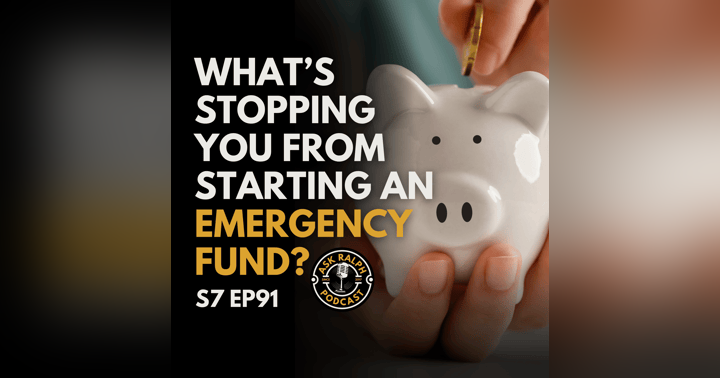How Are Banks Costing You Money Without You Knowing?

What are 10 things that banks don’t want you to know which could cost you money?
Banks often have practices that aren't immediately obvious to consumers. Understanding this and asking the right questions can help you make more informed financial decisions. Join Ralph Estep Jr. on the Ask Ralph Show as he discusses a revealing article from a bank teller's perspective, exposing 10 secrets banks don't want customers to know. He covers topics such as the importance of reading the fine print, the difficulties of closing accounts, hidden fees in 'free' checking accounts, Banks Costing You Money the benefits of credit unions, and the pitfalls of overdraft protection. He provides actionable steps to save money, including reviewing bank statements, negotiating with banks, and setting up account alerts.
Watch Now on Rumble
Secrets Banks Keep From You
Ralph opens the episode by discussing a fascinating article written from the perspective of a bank teller, which uncovers hidden practices and strategies that banks prefer to keep under wraps. He aims to shed light on these practices and show how they impact personal and business finances. Ralph promises to reveal ten crucial things that banks don't want you to know and how understanding these secrets can empower listeners to make better financial decisions.
Feeling Like Just Another Number
Linda, a longtime bank customer, writes in expressing frustration with how impersonal her bank has become. She notes that the staff seems more focused on selling products than on helping her achieve her financial goals. Linda asks Ralph for advice on how to ensure her bank is working in her best interest and if there are red flags she should watch out for. Ralph acknowledges that many people share her feelings, particularly as banks have become more profit-driven and less customer-focused.
Biblical Perspective on Financial Wisdom
Ralph grounds the episode in Proverbs 22:7: “The rich rule over the poor, and the borrower is a slave to the lender.” He explains that this verse serves as a reminder of the powerful dynamics at play in the financial system. The rich, including large financial institutions, often hold control over borrowers, which makes understanding and navigating these power dynamics crucial to achieving financial independence.
Secret 1: Read Everything—Including the Fine Print
Ralph explains that banks often provide extensive paperwork filled with legal jargon that customers rarely read. However, these documents contain critical details about fees, penalties, and other terms that can greatly affect one's financial situation. He emphasizes the importance of reading everything, no matter how tedious, and asking questions when something is unclear. Understanding the fine print can help customers avoid unexpected charges and ensure they know exactly what they are agreeing to when opening an account or taking out a loan.
Secret 2: Closing Accounts Is Harder Than It Seems
Contrary to popular belief, closing a bank account can be a complicated process, often involving paperwork, fees, and in-person visits. Ralph shares that many customers assume they can simply withdraw their funds and walk away, but banks may have additional requirements for account closure. He warns that failing to properly close an account can result in surprise fees, particularly if automatic payments or deposits are still linked to the account. Ralph advises listeners to carefully follow all steps when closing an account to avoid lingering charges.
Secret 3: Free Checking Isn’t Really Free
While many banks advertise free checking accounts, Ralph explains that these accounts often come with hidden fees. Banks may require customers to maintain a high minimum balance or limit the number of transactions they can make before incurring charges. Ralph encourages listeners to closely examine the terms of their accounts and consider whether these "free" options are truly beneficial in the long run. He also suggests that credit unions often provide better options with fewer hidden costs.
Secret 4: Credit Unions Offer Better Loan Rates
Ralph shares a personal story about working at a credit union, emphasizing the benefits of credit unions over traditional banks. As non-profit institutions, credit unions typically offer lower loan rates and better customer service because they are focused on helping members rather than maximizing profits. Ralph recommends exploring credit unions as an alternative to commercial banks, especially for those seeking loans or other financial products, as credit unions are more likely to offer personalized service and lower fees.
Secret 5: Overdraft Protection Is Expensive
Ralph discusses the often misunderstood concept of overdraft protection. While it may sound like a safety net, overdraft protection can lead to expensive fees—sometimes as high as $35 per transaction. Ralph advises listeners to consider opting out of overdraft protection to avoid these costly charges, suggesting that it may be better to have a transaction declined than to incur unnecessary fees that can quickly add up.
Secret 6: Savings Rates Can Change Overnight
Many customers set up savings accounts and forget about them, assuming the interest rates will remain competitive. Ralph reveals that banks often lower interest rates on savings accounts without notice, meaning customers may earn less than they anticipated. He encourages listeners to regularly review their accounts and consider switching to higher-yield options, such as money market accounts, to ensure their money is working as hard as possible.
Secret 7: Debit Cards Can Tie Up Funds
Using debit cards at gas stations, hotels, or car rental agencies can result in temporary holds on more funds than the actual purchase amount. These holds can tie up money and cause overdrafts if additional transactions are made. Ralph advises listeners to be cautious when using debit cards in such situations and to understand how holds can impact their available balance. He reiterates that using credit cards for these transactions may be a better option.
Secret 8: Banks Share Your Information
Ralph discusses the fact that many banks share customers’ personal information with third parties, leading to an influx of marketing materials and unsolicited offers. He explains that customers have the option to opt out of this data sharing but must often do so proactively. Ralph encourages listeners to read their bank’s privacy policy and take action to protect their information if they wish to avoid having their data shared.
Secret 9: Paying Off Loans Early Isn’t Always Smart
While paying off loans early can save on interest, it may also shorten a customer’s credit history, which can negatively impact their credit score. Ralph leaves it up to listeners to decide whether early repayment makes sense for them, depending on their individual financial situation. He suggests balancing the benefits of reducing debt with the potential downsides of shortening one’s credit history.
Secret 10: Coins Add Up
Ralph recalls his time working at a credit union and how many banks charge customers for bringing in coins. While this may seem like a minor fee, it can add up over time. He advises listeners to seek out credit unions or banks that offer free coin-counting services, as well as other customer-friendly features, to save money on unnecessary fees.
Practical Steps for Saving Money
Ralph offers five practical steps to help listeners save money on banking fees: review bank statements carefully, switch to a credit union, negotiate with current banks, use in-network ATMs, and set up account alerts. He encourages listeners to be proactive in managing their finances and to question any recurring fees or unnecessary charges. Ralph emphasizes that banking should work for the customer, not the other way around, and encourages people to shop around for institutions that align with their financial goals.
Reflecting on September 11th and Financial Vigilance
Ralph concludes by acknowledging the significance of September 11th and reflecting on the importance of unity and resilience in the face of hardship. He encourages listeners to remember the sacrifices made that day and to take a moment of quiet reflection. Ralph closes the episode by reminding listeners that staying financially savvy is a key part of securing their futures, and he offers his services to those who feel overwhelmed by their financial situation. He reiterates his passion for helping others achieve financial success while growing in their faith.
Schedule Appointment with Saggio Management Group, Inc. https://app.acuityscheduling.com/schedule/fabfb9f2/appointment/8258839/calendar/2141336?appointmentTypeIds[]=8258839











